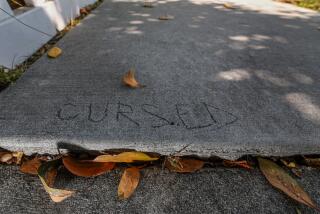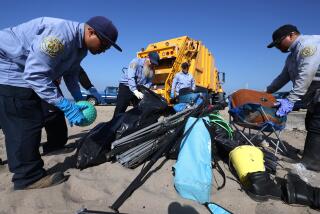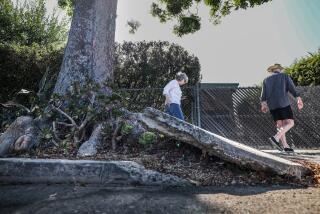L.A. could resume controversial cleanup sweeps in skid row
Armed with a new county report citing the health dangers of feces, urine and hypodermic needles recently found on Los Angeles’ skid row, city officials could resume controversial cleanup sweeps of the downtown area’s streets and sidewalks.
The Los Angeles County Department of Public Health inspected a nine-block area and discovered human waste, injection needles, condoms and a rat infestation in violation of county and state health codes. City officials say they have cleaned up the waste and debris cited by inspectors last month. The county plans to return this week to ensure there are no continuing health threats in the area, which has numerous homeless encampments.
“The human feces are certainly very disturbing, as are the hypodermic needles,” said Jonathan Fielding, the county’s top public health official. “The situation appears to have worsened.”
Fielding said sidewalks and streets in the inspection area, southeast of City Hall, need to be power-washed weekly and the health conditions monitored closely. Unsanitary living conditions and crowding in the camps have increased the risk of spreading communicable diseases such as meningitis, which was diagnosed in four skid row residents in March, according to the county inspection report.
The city requested the inspection as part of its battle against a federal court injunction issued last June that has limited sweeps by police and cleanup crews in the area. The public health report documents the problems that have arisen since the court restrictions took effect, said Special Assistant City Atty. Jane Usher.
“From the city’s point of view, we have a public health crisis,” she said. “There are such vast quantities of materials deposited on the streets and sidewalks.”
The injunction restricted police from seizing abandoned personal property from skid row dwellers. The city appealed and the federal 9th Circuit Court of Appeals is weighing the case. Now, the city is working to create protocols that Usher said would strike a balance between following the injunction and ensuring that people can live and work safely in the area.
There is nothing in the injunction that prevents the city from cleaning up needles, feces or other public health threats, said Becky Dennison of the homeless advocacy group Los Angeles Community Action Network, which supports the restrictions. “The city should respond with thorough street cleaning and trash collection that respects people’s personal property,” she said.
City officials complain that when crews try to remove a pile of apparent debris, someone often claims it’s his personal property.
Other groups, including the Union Rescue Mission, which provides shelter and other services to the homeless, said the injunction has led to a dangerous buildup of human waste and trash on skid row, as police became cautious about touching anything.
“It made you sick to walk down the street,” said the Rev. Andrew Bales, who heads the mission.
More to Read
Sign up for Essential California
The most important California stories and recommendations in your inbox every morning.
You may occasionally receive promotional content from the Los Angeles Times.










